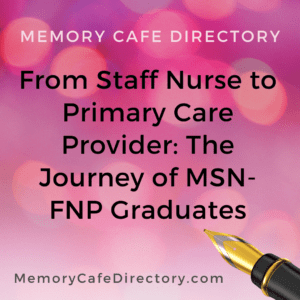Memory Cafe Directory posts and/or links to retailers can be advertising, sponsored, or affiliate links. We may earn a small commission from them. Thank you.
In addition to family caregivers, the Memory Cafe Directory audience also includes a wide range of professionals. Many of those professionals are part of the medical community. Educational opportunities are important for individuals to advance their careers.
Becoming a primary care provider is an empowering career transition for registered nurses who pursue a Master of Science in Nursing, Family Nurse Practitioner (MSN FNP) degree. This educational journey equips nurses with the knowledge, skills, and confidence to deliver comprehensive primary healthcare services.
The American Association of Nurse Practitioners reports that family nurse practitioners make up the largest percentage, accounting for 70.3 percent of nurse practitioners in the profession. This data underscores the importance and high demand for individuals who have completed an MSN FNP program, particularly in primary care settings.
The transition from a staff nurse to a primary care provider involves various stages and challenges, ultimately leading to a fulfilling and impactful role in patient care. In this article, we will explore the journey of MSN FNP graduates, highlighting the key milestones and transformations they experience along the way.
Transitioning to Advanced Practice
As MSN FNP students, registered nurses embark on a journey to bridge the gap between their clinical experience as staff nurses and the advanced practice role of a primary care provider. This transition involves shifting from a task-oriented approach to a more comprehensive and holistic perspective of patient care.
MSN FNP programs emphasize advanced health assessment, pathophysiology, and pharmacology, providing a solid foundation for clinical decision-making. As highlighted by the International Journal of Environmental Research and Public Health, clinical decision-making is a fundamental aspect of professional nursing practice.
It involves utilizing nursing expertise to address the most critical healthcare issues faced by patients, with the ultimate goal of preserving life and enhancing overall well-being.
Expanding Access With Online Degrees
The advent of online education has revolutionized the accessibility of advanced nursing degrees, including MSN-FNP online degree programs. These programs have opened up new possibilities for individuals who may have faced barriers to traditional education, expanding access and creating opportunities for a diverse range of students.
Online MSN FNP programs have removed geographical limitations by allowing nurses from rural or underserved areas to pursue advanced education without having to uproot their lives or commute long distances. This accessibility ensures that qualified individuals from all regions have the opportunity to become family nurse practitioners and contribute to primary care services in their communities.
Marymount University notes that the flexibility offered by online programs enables working professionals to balance their current employment with their studies. By eliminating the need for physical attendance, online programs also make advanced education more cost-effective, reducing expenses associated with commuting and relocation.
Mastering the Art of Primary Care
One of the pivotal phases in the journey of MSN FNP graduates is mastering the art of primary care. Through supervised clinical experiences, FNP students gain hands-on practice in managing acute and chronic illnesses, promoting health and prevention, and developing therapeutic relationships with patients and families. This immersive learning environment allows aspiring primary care providers to refine their skills in diagnosing and treating common primary care conditions across the lifespan.
Embracing Autonomy and Responsibility
Upon completion of an MSN FNP program, graduates step into a role characterized by increased autonomy and responsibility. Transitioning from the supportive environment of clinical rotations to independent practice can be both exciting and challenging.
As primary care providers, FNPs have the authority to diagnose, prescribe medications, order tests, and refer patients to specialists when necessary. This newfound autonomy empowers FNPs to make evidence-based decisions and develop personalized treatment plans that prioritize patient-centered care.
Navigating the Regulatory Landscape
As primary care providers, MSN FNP graduates must navigate the complex regulatory landscape governing their practice. Each state has different scope-of-practice laws and regulations, which impact the extent of autonomy and practice privileges for FNPs. Understanding these regulations and advocating for full practice authority is crucial for MSN FNP graduates to maximize their impact in delivering quality primary care services.
As noted by the American Nurses Association, representatives from six key organizations, including the National Council of State Boards of Nursing (NCSBN), whose members include healthcare regulatory licensing boards, have developed a toolkit to help lawmakers and regulatory authorities in making choices concerning modifications to the scopes of practice of health care professions.
Overcoming Challenges and Celebrating Success
The journey from a staff nurse to a primary care provider is not without its challenges. MSN FNP graduates face hurdles such as balancing work and study, managing a demanding workload, and adapting to the increased responsibilities. However, through perseverance, resilience, and the support of their peers and mentors, they overcome these challenges.
Celebrating the milestones achieved along the way, such as passing certification exams and witnessing positive patient outcomes, further motivates MSN FNP graduates to continue their journey and make a difference in the lives of those they serve.
Impacting Communities and Shaping Healthcare
As MSN FNP graduates establish themselves as primary care providers, they play a vital role in impacting communities and shaping the future of healthcare. By providing accessible and quality primary care services, they contribute to improving health outcomes, reducing healthcare disparities, and promoting preventive care.
MSN FNP graduates also have the opportunity to advocate for policy changes that support their practice, expand access to care, and address the evolving needs of diverse patient populations. Through their commitment and dedication, they become catalysts for positive change in the healthcare landscape.
Final Thoughts
The journey from being a staff nurse to becoming a primary care provider through the pursuit of an MSN FNP degree represents a transformative pathway in the field of nursing. This educational progression empowers nurses to deliver comprehensive primary healthcare services and positively impact patient outcomes.
The integration of online education has revolutionized access to advanced nursing degrees, breaking down geographical barriers and providing flexibility for working professionals. Throughout this journey, MSN FNP graduates navigate challenges, embrace autonomy, and contribute to shaping healthcare policies.
Their dedication to delivering quality care and promoting community well-being establishes them as catalysts for positive change in the healthcare landscape.






